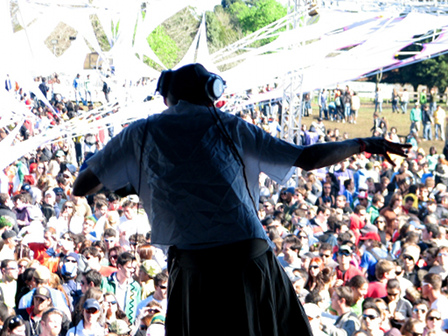In early May of 2012, "Paraisos Artificiais" (Artificial Paradises), a major motion picture, premiered in cinemas all over Brazil. It's been one of the most highly anticipated cinematic events of the year. The film was directed by Marcos Prado, one of the most successful film producers in Brazil who is responsible for two of the biggest blockbusters in our recent history: "Elite Squad" and "Elite Squad II: The enemy within". "Paraisos" is a coming-of-age tale set in the emerging Brazilian electronic music scene. It tells the story of Nando, Erika and Lara, a threesome of sorts who, together, undergo profoundly sensual experiences in a psychedelic trance festival set in an idyllic and isolated beach. These experiences end up intertwining and changing their lives forever, unfortunately not for the best.
The festival depicted in the movie is a carbon copy of major gatherings like "Universo Paralello": a seven day New Years' festival in its eleventh edition that brings twenty thousand ravers annually to a deserted beach in Bahia, northeastern Brazil. Although the biggest, this is just one event in a thriving scene of e-music culture that is spread all over Brazil. Curiously, though, such a popular movement receives almost no media attention besides the usual drug related scandals in exploitative journalism. Actually, this film marks one of the first times Brazilian media has touched more deeply on such controversial subject. But I believe there's a good reason for such omission, one which lies in the paradoxical modus operandi of the Brazilian bias.
For an outsider, Brazil may seem like an easygoing and morally loose society. But this is not completely true. Obviously, there is some truth to the stereotype: we do have, in some way, an easy-going, openhearted nature. But, in truth, we have a profoundly moralistic ethos inherited from our Roman Catholic colonization. It's a curious ethical stance though: one which may permit people to wear clothing that show an awful lot of skin but, at the same time, condemn certain individual freedoms that are essential to other "morally strict" societies. It's the kind of hypocritical stance typical of our culture, which makes dealing with the chaotic amorality of the rave scene's bacchanalia a little bit harder. A certain deal of struggle against such anachronisms already exists. But, unfortunately it's not the case in this movie, where this mentality is blatantly evident.
So at last the Brazilian e-music scene renders itself to the serious approach of the more traditional media. Usually, though, the traditional media exposes traditional prejudices. So it should come as no surprise that they chose to portray it in those terms. The tale, as it is told, seems to make a deliberate effort not to focus on the positive and integrative aspects of the psy-trance culture. It never even bothers to look deeper into the reasons that make people become ravers or start going to festivals in the first place. There isn't much about the human side of it. They never talk about dancing, re-empowering the body, exhaustion, or transcendence. Neither do they talk about the gathering, the exchanges that are taking place there. Much less so they talk about the sickness of our world, which some people there are trying to be healed from. Instead, they choose a story about vanity, boredom, nihilism, and irresponsibility.
The only story I can tell is mine, and it just happens to be a redemptive one. For I'll never forget the first time I went to a festival. I was nineteen years old and utterly immature: just out of high school and still a virgin in many, many ways. Back then, it seemed like the most important event ever to have happened in my whole life. My four best friends came along with me. Just the five of us and our freedom. We partied hard, that's for sure. With MDMA as our weapon of choice, we danced like we never had before, we bonded deeply with each other, even more deeply with our bodies. I took acid for the first time: it scared the shit out of me! But it was ok to be afraid, I was far away from everything I'd ever called home, and, at the same time, I was building a new one for me. We hadn't much time for flirting or befriending people, we were simply overwhelmed by the substances, the music, the elements — by the power of it all. We looked at each other in awe. We had to tell every one of our friends about that magic place. That magic thing that happened there needed to be shared!
Of course we were vain, and bored, and nihilistic and irresponsible. We were teenage Brazillian bourgeois, for fuck's sake! It was almost mandatory to be those things. Of course we were there for the drugs, and nature, and everything else that may sound forbidden: we were there for the fun! Real fun! Not what they passed around in our cities: drinking ourselves sick in uttermost tedium. We wanted a life empowered by laughter, by adventure, by sun-tanned gorgeous women, by freaks and the right to be or become one. We needed those fantasies, even if that were all that they would prove themselves to be, illusions. We needed them to go on.
And so we did, and seven years later there I was again, for the fourth time. Luckily I had changed completely: I became what I dreamt to be when I got there first. Not exactly what I had dreamed, but I had found what it takes for me to live my life like I really wanted. I was working with the stuff I love. I had asked the woman I love in marriage. I responsibly debauched on strange chemicals and never became a drug addict and I was content with it all. I had somehow taken that freedom that I learnt there and brought it to my ordinary existence. This had made my life more passionate, more adventurous. In a certain sense it made me more me. Then, when it ended, I felt tired. Like moving on. Like I had come to the end of it. I had gone through this, I came of age there. Now I needed it no more. But it was going to be hard to ever forget it.
Obviously there is a great difference between my story and the one told in "Paraisos Artificiais", in which every individual who has ever been to a festival, used drugs or engaged in unusual sexuality has a dire destiny. But this is far from being the worst problem here. What this picture does, in its microcosm, is to reproduce the aforementioned moralistic duality ever so present in the Brazilian society macrocosm. For, while the final lesson is inevitably related to the undeniable risk involved in such activities, the film's structure borders on the Exploitation genre, with nude hot chicks, girl on girl scenes and a threesome in the end. Actually, not only the nakedness is put on an exploitative stance, but every image in it has a high degree of plasticity, being molded to look somewhat like a Levi's commercial on acid. Everything is fake, raised to its ultimate virtuality. Even in such a nasty environment (and believe me, I've never been as dirty as I was at such festivals) all actors' (hot) bodies are always antiseptically clean. They even look like dolls sometimes.
Being part of the electronic music generation in Brazil I was very curious but also very wary about this. Actually what made me curious was the possibility that the director could be brave enough to go against what I already expected of him: the chance that he might surprise me. Watching the feature's lengthy and boring ninety minutes, I was surprised the other way around. This film stands as the pastiche for all our generation ever was, it does not even respect those it portrays. I've read in interviews that the director's motivation for shooting this was his son's interest in rave culture. This actually made him go to several festivals, even Burning Man, which is at the same time something completely different and the archetypical matrix for every contemporary freak-fest in the world. It seems to me like he has learned nothing from those trips. The feeling that I have from it, is that not a soul on this endeavor has got an idea about what's happening to us. They are clueless about virtually every aspect of their subject and resort to mere cliché. In the end, what this proves to me, as a freak, is that no matter what, the mainstream will always fear that which it cannot control. Especially if it is something as seductive, empowering and strange as a psychedelic revolution.
Image by Felipe Skroski, courtesy of Creative Commons license.















